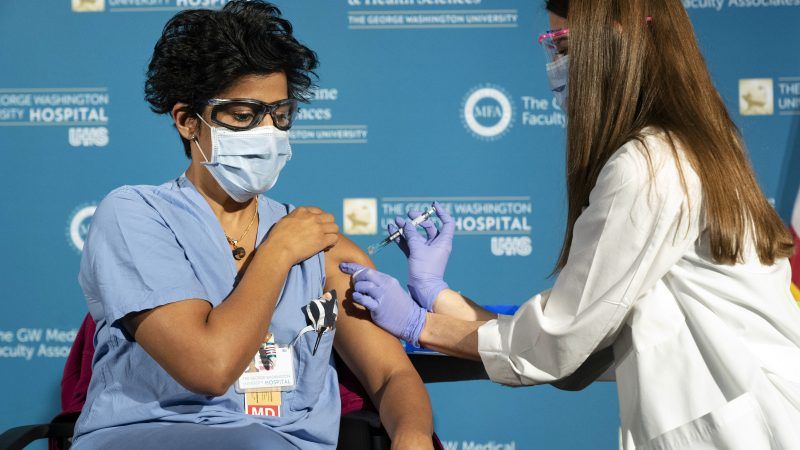D.C.'s Unscientific Vaccination Plan Pits the Elderly Against the Obese
Even as the district struggles to vaccinate seniors, it will soon allow half the city to get in line.

When Washington, D.C., enters its next phase of vaccine distribution in February, all residents who are smokers, have asthma, suffer from high blood pressure, are obese, or possess a wide range of other health conditions will be permitted to get the jab.
The list of included conditions is so vast that a huge portion of the city will be eligible. For instance, the city considers an obese person to be anyone with a body mass index (BMI) of 25 or higher. But as Nate Silver points out, the average U.S. adult male possesses a BMI of around 29. (BMI is a flawed tool for gauging health in any case, as people who are extremely muscular tend to have high BMI scores even though they are not obese.)
There's practically no scientific basis for this plan. While the morbidly obese may be at risk for worse-than-normal COVID-19 health outcomes, people with a basically average BMI do not fall into this category.
"We don't see anything in our data—and this is a very large data set that I'm talking about—I don't see an association below [BMI] 30," Sara Tartof, an epidemiologist with Kaiser Permanente, told The Washington Post. "And for death, we don't see a statistically significant association below 40."
The Post's article is unrelentingly critical of the district's vaccination plans, and for good reason. Like many other municipalities, D.C. has encountered logistical difficulties as it attempts to vaccinate its health care workers and seniors, with long lines, appointments that fill up the second they become available, and technical problems with the city's website. D.C. has not yet vaccinated everyone in the 65+ category, which is by far the most at-risk population. Government officials and health experts all over the country must do a better job ensuring that the elderly receive the vaccine first—because deaths from COVID-19 are overwhelmingly concentrated among the very old.
But D.C.'s new vaccination plan—which is truly unique in all the country, in terms of sheer expansiveness, according to the Post—will ensure that many, many people who are not in the extremely at-risk 65+ category are now able to take up spots in line. This is very bad. If health officials are vaccinating fewer seniors because they are vaccinating people with asthma or slight weight issues, they are not engaged in a rational prioritization of existing vaccine reserves.
The Post article suggests that city officials were unhappy with the racial breakdown of vaccination; D.C. was vaccinating many more wealthy and white senior citizens than poor and black senior citizens. Since the city's minority population is disproportionately obese, the government's thinking is evidently that the new prioritization plan will include more minorities. This is deeply misguided—akin to the CDC's initial, eventually revised guidance that suggested many "essential workers" (an ambiguous category) should be vaccinated ahead of the elderly in order to remedy racial inequities.
In fact, the D.C. plan is much worse, because just about anyone can claim to possess one of the prioritized conditions. The city has confirmed that vaccine providers will not ask for verification of a person's BMI or smoking history.
"With a lot of this, it's the honor system, attestation," Ankoor Shah, a pediatrician directing the city's vaccination program, told the Post. "As a health department, as a city, we have to strike that balance of ensuring the right people are getting in line without creating barriers for them."
There are many, many, many groups claiming they should be covered under "the right people." Kidney doctors and patients have released a statement requesting prioritization. So have people with intellectual disabilities. So have dentists, diabetes patients, and farmworkers. In a strict sense, they're right: Everybody should get the vaccine! It's a miracle prophylactic for a horrible disease that's killed millions of people.
But while supplies are limited, we need to prioritize vaccination for the most at-risk population. The "right people," to use Shah's phrasing, are the elderly. Any plan possessing so many loopholes that most people who are not 65+ could nevertheless find a way to justify vaccine prioritization for themselves is idiotic. It's akin to saying that everyone—barring the exceptionally fit and healthy—should go ahead and get in line or book an appointment right now.


Show Comments (94)